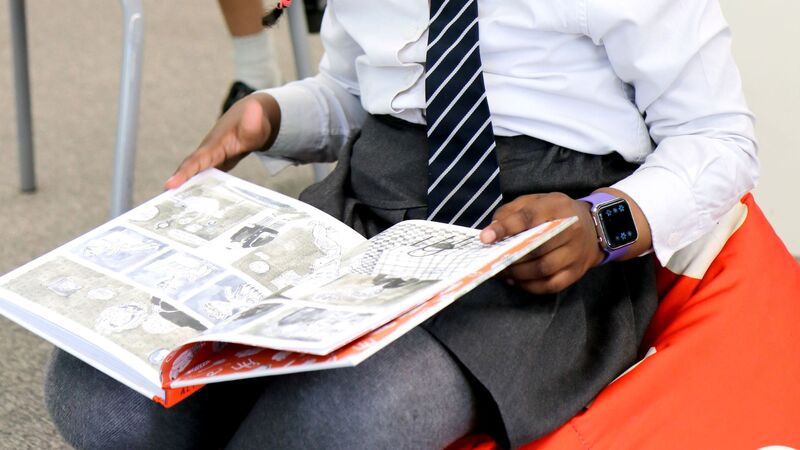You are viewing your 1 free article this month. Login to read more articles.
Video games help literacy skills in boys and reluctant readers, research finds
A survey conducted by the National Literacy Trust, to launch its new partnership with Penguin Random House Children’s and the Association of UK Interactive Entertainment, has suggested that video gaming can enhance literacy skills in boys and reluctant readers.
The survey quizzed 4,626 young people aged 11-16 living in the UK, and found that video games can provide young people with a "route into reading" and improve confidence in reading skills. The results showed 79% of participants who play video games read materials relating to gaming, including in-game communications (40%), reviews and blogs (31%), books (22%) and fan fiction (19%), while 35% believe playing video games makes them better readers.
The benefits for enhancing literacy skills were found to be strongest for boys and reluctant readers, as the survey found that boys are much more likely to play video games than girls (96% vs 65%) and nearly twice as many boys than girls said they chatted with family and friends as part of playing a video game during lockdown (71% vs 40%).
The research was carried out as part of a new joint campaign from the three companies to explore the relationship between video games and literacy engagement among schoolchildren.
Jonathan Douglas, chief executive of the National Literacy Trust, said: “We know that video games are a part of everyday life for so many children, young people and families across the UK, so it is exciting to uncover the opportunities that video game playing can provide for young people to engage in reading, stimulate creativity through writing, enhance communication with friends and family, and support empathy and wellbeing.
“Covid-19 has significantly disrupted young people’s literacy and learning in recent months, and we want to ensure that no stone is left unturned when it comes to identifying new and innovative ways to support children’s literacy when they return to school in September. Through our partnership with UKIE [the UK trade body for the games and interactive entertainment industry] and Penguin Random House Children’s, we hope to be able to provide families and schools with the resources and tools they need to harness the benefits of video games for young people’s literacy.”
Video games were also found to be effective at engaging reluctant readers with stories, as the survey suggested 73% young people who don’t enjoy reading say playing video games helps them "feel more part of a story" than reading a text-based book.
Playing online games is also thought to encourage creativity through writing, as 63% of children surveyed said they wrote pieces, including video scripts, player advice, fan fiction and blogs as a result of their hobby. The survey also found 58% of young people expressed an interest in writing and designing video games, with 31% desiring the opportunity to do so at school.
Alex Moyet, brand director at PRH, said: “Many of our authors have previously spoken about their love of video games and how games have inspired and influenced their writing, and so it’s interesting to see from the research how many young people can use gaming as a route into stories and encouraging their own reading. By partnering with UKIE and the National Literacy Trust, our aim is to work together to provide the tools and resources required to encourage reading that can take young people on magical adventures, whilst increasing their creativity, empathy and imagination.”
In addition to improving literacy levels, the shared experience of playing games online was found to support "positive communication" with friends and family, and build social connections "in real life". Three quarters of participants said they spoke to their peers about gaming, compared with 29% who discuss books.
Parents have also said video games have supported mental wellbeing during lockdown, and had helped them deal with stress and difficult emotions.
Scriptwriter, story designer and author Rhianna Pratchett has worked on popular games including "Tomb Raider", "Heavenly Sword" and "Mirror’s Edge", and has written the Tomb Raider graphic novel series (Dark Horse Books/Penguin Random House). Commenting on the research, she said: “Video games transport us into new worlds, new experiences and make us feel part of the story like no other medium. It's no surprise to see that young people's engagement with video games is at an all-time high, and it's great to see the important work the National Literacy Trust are doing to better understand how games can help improve literary, emotional engagement and understanding in their audience.”
To support children's literacy progress through video games, NLT, UKIE and PRH have launched a range of online resources. This includes a book list designed by PRH for children aged eight to 13 who enjoy gaming, a list of recommended video games to support learning, and an exclusive video interview with Pratchett and gaming expert and journalist Andy Robert.
Dr Jo Twist, c.e.o. of UKIE, said: “This excellent research shows both the benefits of games on children’s literacy and how valuable a part they are to young people’s lives. Games are a fantastic way to inspire creativity, encourage exploration of worlds and characters, and to get young people talking with friends or family. We look forward to working with our partners to build on this work to show the positive impact of games as a medium.”


















